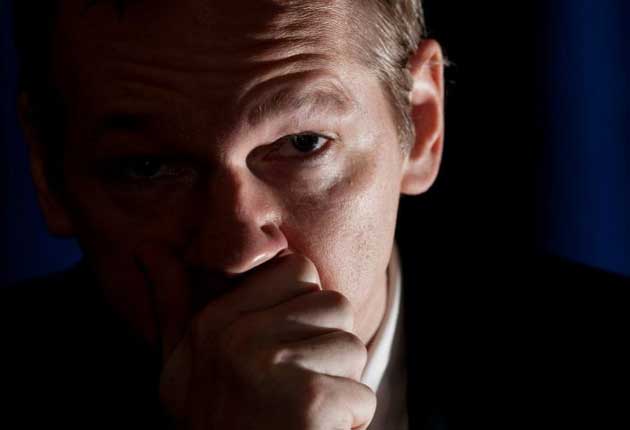WikiLeaks hit by new online onslaught
PayPal joins US firms and officials targeting site

Your support helps us to tell the story
From reproductive rights to climate change to Big Tech, The Independent is on the ground when the story is developing. Whether it's investigating the financials of Elon Musk's pro-Trump PAC or producing our latest documentary, 'The A Word', which shines a light on the American women fighting for reproductive rights, we know how important it is to parse out the facts from the messaging.
At such a critical moment in US history, we need reporters on the ground. Your donation allows us to keep sending journalists to speak to both sides of the story.
The Independent is trusted by Americans across the entire political spectrum. And unlike many other quality news outlets, we choose not to lock Americans out of our reporting and analysis with paywalls. We believe quality journalism should be available to everyone, paid for by those who can afford it.
Your support makes all the difference.WikiLeaks suffered the most serious blow in its struggles with corporate and official America yesterday when PayPal, the payments processing company, suspended the organisation's account. The move will have a major impact on WikiLeaks' ability to collect donations.
A statement by PayPal, which is owned by eBay Inc, said: "PayPal has permanently restricted the account used by WikiLeaks due to a violation of the PayPal Acceptable Use Policy, which states that our payment service cannot be used for any activities that encourage, promote, facilitate or instruct others to engage in illegal activity. We've notified the account holder of this action."
Attempts to donate to WikiLeaks via PayPal yesterday were greeted with an error message. PayPal has been probably the most convenient way to support the organisation.
In other developments yesterday, Mark Stephens, the lawyer for Julian Assange, the WikiLeaks frontman, said that the US diplomatic cables released so far constitute a mere 0.2 per cent of the material available. What lies in that missing 99.8 per cent may explain the US reaction.
Mr Stephens also revealed some of the bizarre aspects of the Swedish prosecutor's action over charges against Mr Assange for rape, sexual molestation and unlawful coercion. "Julian has been pursuing contact with the prosecutor," he said. "She has made no contact whatsoever... He has not been told the nature of the evidence against him."
He confirmed that Scotland Yard received the corrected arrest warrant on Friday, and expects it to take 10 days to be processed. Mr Assange is at a location in the Home Counties, which is known to the police.
Last night, WikiLeaks was still online, with wikileaks.nl functioning, but wikileaks.ch (owned by by the Swiss Pirate Party, a group of freedom of information campaigners) and wikileaks.de in Germany not responding. This is despite what appeared to be widespread, if not actually concerted, US efforts to hamper it, and extract some sort of revenge.
The PayPal action follows a spate of stingers thrown in the path of WikiLeaks by sundry US organisations. On Wednesday, Amazon.com stopped hosting Wikileaks.org after US Congress staff started asking the firm about its links to Mr Assange's site. The following day, another US company, EveryDNS, which provides free domain names, stopped directing traffic to WikiLeaks after cyber attacks by hackers.
WikiLeaks has also been brought down by denial-of-service attacks. In these, remote computers infected by rogue programmes bombard a website with so many data packets that it is overwhelmed. The attacks can be carried out by amateurs.
Then there is the political activity. The US is conducting a criminal investigation into the release of diplomatic cables, claiming they threaten national security and diplomatic work. In Washington, the incoming chairman of the House Judiciary Committee, Republican Lamar Smith, says he plans to hold WikiLeaks hearings in January. Other legislators have talked of possible charges against Mr Assange, anonymous death threats have been made, and Republican Sarah Palin has said: "Why was he not pursued with the same urgency we pursue al-Qa'ida and Taliban leaders?"
Beyond the inadvisability of giving unlimited access to diplomatic cables to plainly unreliable employees, the leaks so far have done remarkably little harm to the reputation of the US internationally. But the apparent marshalling of corporate America, assorted showboating legislators and, quite possibly, techno-savvy "patriots" acting as guerrilla deniers of service in an attempt to harass WikiLeaks out of existence may be what, in the end, does the real harm. The country's over-reaction is looking increasingly like that of a bully who, having had his nose put slightly out of joint, is determined to batter the upstart into a pulp. If America wanted to convince the entire online world that it has no sense of perspective, the past few days have been a triumph. Talk of boycotts is now in the air.
Among the latest cables is one from a US diplomat in Beijing telling Washington that the hacking into Google which forced it out of China was prompted by a Politburo member. He had searched his name on Google and found articles criticising him.
Join our commenting forum
Join thought-provoking conversations, follow other Independent readers and see their replies
Comments